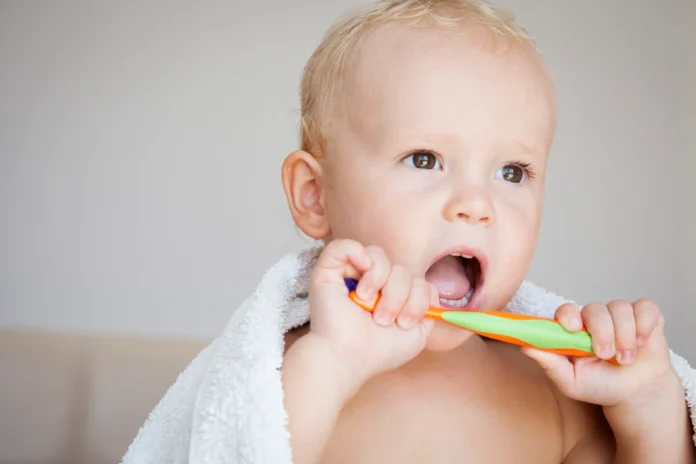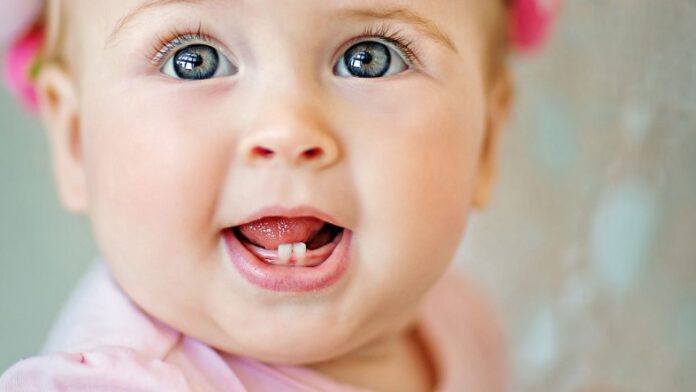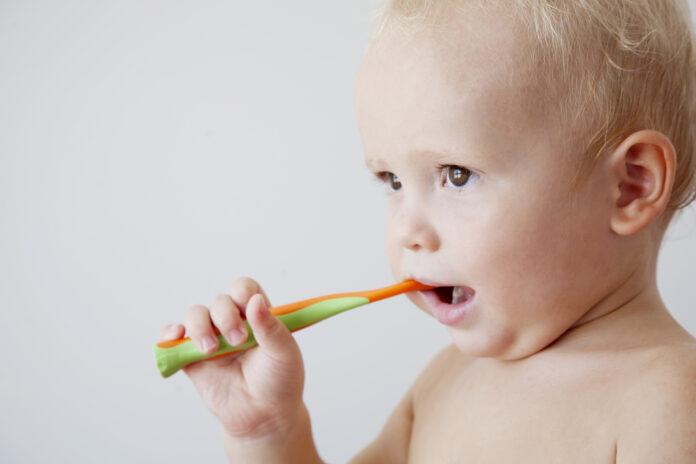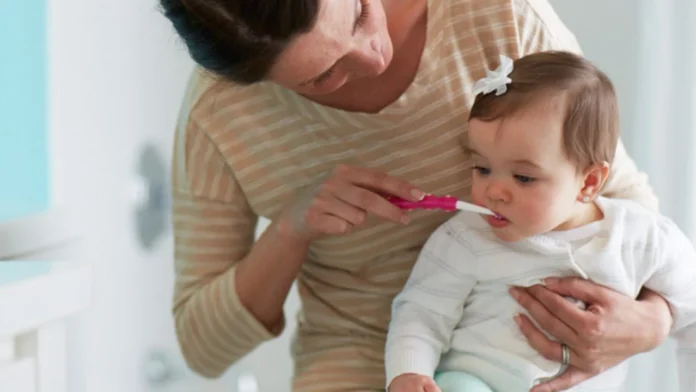
It’s easy to assume that your child’s oral care routine begins as soon as they cut their first tooth. Now that they have teeth to brush, you can purchase a baby toothbrush and toothpaste and start keeping them clean.
However, oral care can start much sooner, and you don’t even have to wait until teeth begin to grow. There can be many unknowns when you become a parent for the first time, but oral healthcare doesn’t have to be one of them. Consider the information in this guide below, and you might set your child up for a lifetime of good oral hygiene habits.
When to Start Brushing Your Baby’s Teeth

You can click here to learn how to brush baby teeth, but many parents also wonder when teeth brushing should begin. You can start brushing with a soft-bristled baby toothbrush, water, and fluoride toothpaste the size of a grain of rice as soon as your baby cuts their first tooth or from six months old. The brush should have no more than three rows of bristles and be replaced after two or three months. If you notice that their toothbrush has any roughness, consider replacing it before that timeframe.
Brushing Baby’s Gums
While toothbrushing can begin as soon as your baby cuts their first tooth, an oral hygiene routine can begin much sooner. Pediatric dentists recommend starting from birth by gently wiping the front of the tongue and the gums after each meal and after their last nursing session for the evening. This process promotes excellent oral health before they cut their first tooth and fights bacterial growth.
You might use a soft, damp washcloth, a gauze pad, or a specially-designed finger brush with food-grade silicone and delicate bristle-like features. The earlier you begin, the sooner your child can familiarize themselves with the brushing motion.
How to Brush Your Child’s Teeth

Most of us know how to take care of our own oral health needs, but taking care of our children’s brushing can sometimes be much more challenging, especially as they reach different developmental ages. How you assist your child can depend on their age group.
0-6 Months
From when your baby is born until they’re around six months old, you can lie them down in a comfortable position that enables you to look in their mouth. With a clean, damp washcloth, wipe the gums along the tongue and cheek side of their mouth at least twice daily.
6-12 Months
When your baby cuts their first tooth, you can upgrade the washcloth to a baby-appropriate toothbrush and begin using a rice grain-sized amount of fluoride toothpaste. Lay your baby down and gently brush their teeth and gums twice daily, after their first feed of the day and before they’re down for the evening.
1-3 Years

Position your child so that you can see inside their mouth and gently brush their teeth and gums along the cheek and tongue side and where they bite food. Give your child some independence to handle the toothbrush themselves, preferably after you’ve cleaned their teeth thoroughly.
As you would brush your own teeth twice daily, do the same for your toddler after they’ve had their first meal and before bedtime. At this age, you might also like to start using floss picks or string floss to reach between teeth that will now be touching each other.
3-8 Years
Children between the ages of three and eight can now use a pea-sized amount of toothpaste with their child-friendly toothbrush. Brush all biting surfaces along the cheek and tongue sides of their mouth. Brush twice daily for at least two minutes, and encourage your child to spit out the toothpaste after they have finished.
There is no need to rinse after brushing since fluoride toothpaste works best when it has a chance to be absorbed by the enamel. Floss once per day and encourage children toward the age of eight to brush and floss independently. However, you might still need to help them ensure they brush and floss properly.
Why Brush Before Bed

Most dentists recommend brushing your and your children’s teeth before bed. It might not seem important if you haven’t eaten right before going to sleep, but it can be for cavity prevention purposes. If food particles are left on your teeth all night, the bacteria in your mouth can consume those particles, create acid, and break down the outer surface of your teeth, resulting in cavities.
While our saliva usually helps combat that acid during the day, we don’t produce saliva at night to assist with this process. If you brushed your teeth before bed, then indulged in a late-night snack, you can either rinse your mouth with water to remove those food particles or brush your teeth again.
Tips for Children Who Hate Brushing Their Teeth
Teeth brushing and flossing can be uncomfortable for young children and babies, especially if their gums are sore and tender while cutting new teeth. Fortunately, there are ways to engage your children in brushing and make it as straightforward as possible. Always be gentle, especially with babies whose gums are sensitive. If they are uncomfortable with a toothbrush, opt for a soft washcloth to take care of most cleaning requirements.
Older children might struggle to sit still for the entire brushing process, so consider singing a song to distract them. You might also have some luck by letting them hold and examine their toothbrush and even mimic brushing themselves. You can lay a foundation for an excellent dental hygiene routine with perseverance, patience, and consistency.

The Importance of Oral Health
Children don’t understand that good oral hygiene is crucial for their overall health, and parents and dentists must instill this knowledge from a young age. Brushing and flossing can prevent bad breath, cavities, and gum disease, which are known to impact children’s self-esteem, sleep quality, chewing abilities, speech, and more. A lifetime of poor oral hygiene habits might also contribute to several conditions you might not have expected, such as:
- Tooth loss
- Dementia
- Pneumonia
- Diabetes
- Kidney disease
- Ulcers
Oral care can sometimes fall by the wayside when you’re so busy taking care of your child’s every other pressing need. However, by starting a consistent oral care routine early on, you might set them up for a lifetime of good habits.











